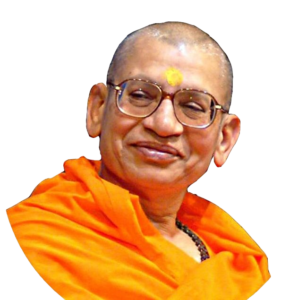
Spirituality: Īśvara controls the result of our action
By Swami Viditatmananda Saraswati*
Na Me Bhaktaḥ Praṇaśyati – 12
Surrender Results of Actions to īśvara. Trust īśvara to decide the results of actions. As we have said, devotion is making every action an occasion for giving up or offering our rāga-dvesas. The first step in offering action to īśvara is simply doing what is right. Choose action by following the order, dharma, which is īśvara, rather than following your own desires.
Lord Krishna teaches the second step in offering action with this instruction:
“Karmayevādhikāraste mā phaleshu kadācana (when you perform an action, recognize that you do not control the outcome).”
Īśvara controls the outcome. Therefore, we have this attitude toward the result of action. First, we have the attitude of performing the action as an offering to īśvara. Secondly, we have the attitude that the karma-phala is coming from the Lord, that he decides the result. I decide what I should do and he decides what the outcome is.
This is all a matter of śraddhā, a matter of faith. This faith makes sense because it is not faith without reasoning. This is faith based on reasoning, but it is still faith because we have to discover it as a reality. We accept it, pending discovery. These facts have to be discovered in our lives. We have to discover what Lord Krishna says and what he means.
Our discovery and our conviction should be that īśvara is really our well-wisher. Until it is your experience and conviction that whatever īśvara gives is for your well-being, accept it in good faith. Give him the benefit of the doubt, instead of giving the benefit of the doubt to the ignorant and insecure ego. Lord Krishna says “I decide the result” because the outcome of your action is determined by the laws of karma and the laws of creation. All of these laws are created by īśvara. Therefore, saying that the laws decide the outcome is saying that īśvara, in the form of the laws, decides the outcome. Thus, a bhakta’s perception is that karma-phala, the result of an action, comes from īśvara.
Deciding results requires all knowledge
Īśvara is the karma-phala-dātā, the dispenser of the result of the action. Īśvara is the karmādhyaksha, the witness of all actions, and īśvara alone is competent to decide what the outcome of any action should be.
When an action is performed, countless variables contribute to the fulfilment or accomplishment of the action. Some factors are visible and many are not visible. Consider the simple action of speaking being performed right now. I am speaking and you are listening. But how many factors are involved in making this possible? The factors are countless. That I am speaking and you are hearing are the major factors. But that I am here is due to many reasons and that you are here is due to many reasons.
That I can speak also is due to the fact that the organ of speech is functioning and that is because of the grace of the presiding deity of the organ of speech. That you can hear is because your organ of hearing is functioning, which again is because of the grace of the presiding deity of the organ of hearing. For anything and everything that takes place, the Vedas say that there is a presiding deity, meaning īśvara in that form. Īśvara is involved in actions in the form of different presiding deities, whose grace is necessary for any action to occur. Īśvara, as the Sun, makes it possible for the eyes to perceive. Īśvara in the form of the fire god presides over the organ of speech.
When we say that the organ of speech functions because of the grace of the fire god, that is nothing but the grace of īśvara who, as the fire god, makes possible the act of speaking. I can walk provided that I enjoy the grace of the deity that presides over the function of walking. I can talk provided that I enjoy the grace of the deity that is responsible for the function of talking. You can hear because of the grace of the presiding deity of the function of hearing. Thus, every moment, anything that happens always presupposes the grace of īśvara. And we are here at this event because of his grace alone. If we look into all that has happened for this event to become possible, we will find that countless factors have been involved.
To determine what the outcome of an action should be, all of these countless factors must be taken into account, and that requires total knowledge. Accounting for all the visible and invisible factors requires omniscience, all knowledge, because the whole universe participates in every action. Therefore, only the one who knows the whole universe can really decide what the outcome should be. That all-knowing one is īśvara.
Īśvara dispenses all results for our well-being
When īśvara decides what the outcome of an action should be, is it merely a mechanical law of cause and effect? Is it just that the effect, the karma-phala, is in keeping with the cause, the karma? That is what the Naiyāyikas, the logicians, would say. Logicians would say that the outcome is in keeping with the input or the effort, and therefore īśvara gives the results in accordance with our effort.
But what would the bhakta say? A bhakta or devotee would say that yes, īśvara does give us the result in accordance with our action, but īśvara is much more than a neutral judge. The result is certainly in keeping with our effort, but at the same time, the result is given to us in such a manner that it becomes a blessing to us. It is a matter of attitude. A bhakta’s attitude is that whatever īśvara does, he does it as my well-wisher.
Think of it as a partnership between ourselves and īśvara, like this example of a singles match in tennis. I am on one side of the court and īśvara, who is my coach, is on the other side of the court. I serve the ball and he hits it back. But since he is a coach, he hits it back to train me, not to defeat me. There is a difference. If he were my competitor, he would hit it back to defeat me. My coach hits the ball back to train me.
When I serve the ball or perform an action, he hits it back and gives me the result. I should not expect that the coach will return the ball to where I am standing every time because that would not help me grow. Sometimes, when he returns the ball to where I am standing, I get a good shot off his return and feel happy. Not realizing that it is he who has given me a convenient shot, I take the credit and feel good. I say, “I made that shot” not realizing that īśvara was the one who was kind enough to encourage me. The point is that when good things happen, it is an encouragement.
Sometimes, when he hits the ball to a corner away from me, I might complain, but it is really up to me to run and get the ball. That is when he is training me. When things happen as I want them, it is to encourage me. When things happen that I do not want, it is to train me. In either case, what is involved is only his grace. When he finds that I am too tired and disappointed, he encourages me. Otherwise, he takes me to task and makes me run from one side of the court to the other, back and forth, front and back.
If this is my śraddhā, and I look upon the player on the other side of the court as my coach rather than as my competitor, then I know his intentions. He is always my well-wisher. He has no agenda of his own. His only agenda is for my well-being, and for me to grow. He is my suhrid, my well-wisher.
to continue…
*Swami Viditatmananda Saraswati has been teaching Vedānta Prasthānatrayī and Prakaraṇagranthas for the last 40 years in Ahmedabad, Gujarat. Throughout the year, he conducts daily Vedānta discourses, accompanied by retreats, and Jñāna Yajñas on Vedānta in different cities in India and foreign countries.
Image by Mohamed Hassan from Pixabay






